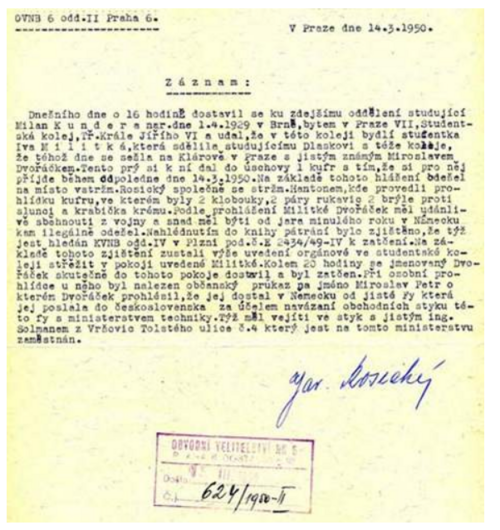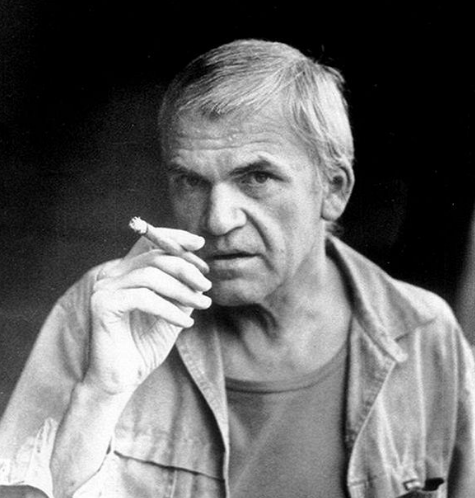
Milan Kundera - Czech writer
From public forums to the sidelines, from Stalinist lyricist to world novelist, from Brno to Prague and Paris, from Czech to French.
Milan Kundera is a Czech writer living and working in France. He writes his works in both Czech and French. In 1979, he was deprived of Czechoslovak citizenship, and his work was banned in Czechoslovakia until the velvet revolution in 1989. He is the author of poems, dramas, prose and essays, and is also a translator.
His maybe most known and popular novel is The Unbearable Lightness of Being which was also filmed in 1988 starring among other Julietta Binoche and portraying Czechoslovak artistic and intellectual life during the Prague Spring, and the effect on the main characters of the communist repression that resulted from the Warsaw Pact invasion of Czechoslovakia in 1968.
Milan Kundera is living in France since 1975. But in this blog I will not write about his books, you can find a lot about him online I am sure. I will write here about his life in Czechoslovakia and about development of his opinions generally which show very well not only the political line of Czechoslovakia during the second half of 20th century but the whole process of intellectual development of filosofical and political positions by many important representants of nations living under the Soviet influence.
Father of Milan Kundera Ludvík Kundera was pianist and muzicologist . During the WWI he joined Czechoslovak Legions in Russia and travelled across whole Russia to Vladivostok to be then transported home. Since 1948 he became rector of Janáček Academy of Music in Brno.Getting this important university position supposed naturally his engagement in the communist party.
Milan Kundera by his life shows the path from a convinced Stalinist through a reformist communist to the position of author on the index, on the other hand, from a socialist lyricist to a rational prose writer of the "dark corners of the soul."
He was a member of the generation that entered literary life soon after the seizure of power by the communists and since the mid-50s and by the early 60's. he belonged to the prominent figures of official literature as an extremely popular and praised by oficial critics. In 1948 he joined the Communist Party of Czechoslovakia.
As a young student Kundera in 1950, according to the police record, announced Miroslav Dvořáček, a Western agent, to the national security corps (SNB). Respekt magazine in its issue of 13. October 2008 brought an article by Adam Hradilek from the Institute for the study of totalitarian regimes, in which the author stated on the basis of the record he discovered that 14. on March 1950, Kundera was supposed to appear at the SNB, and he was supposed to testify that a man had left a suitcase in the custody of one of Kundera's roommates from the student dormitory." This happened in the hardest, darkest communist times in the year when a lot of people were sentenced to death by the communists.
Institute for the study of totalitarian regimes discovered the record about it already years ago.
 Document of Secret police from March 1950
Document of Secret police from March 1950
Secret police reacted briskly - it took only few hours to arrest Dvořáček. M.Dvořáček was sentenced to 22 years in prison, of which he spent almost 14 years in the harsh conditions of labor camps.He stood trial in September 1950, accused of defection, espionage and high treason. Judges usually sent these people to the execution for such crimes at the time, which was also suggested by the prosecutor's office. He finally served 14 years.
Kundera himself called these allegations a lie and said that he could not explain how his name got into the SNB record however, neither the Institute for the study of totalitarian regimes nor the Dvořáček doubted the authenticity of the materials. Markéta Dvořáčková said: "as for the data concerning my husband directly, that is, the situations in which he himself participated and which were recorded, we did not find anything in the documents that did not correspond to reality."
Denunciation plays a big role in Kundera's work. Maybe part of his past will also become another key to the interpretation of his texts. His well known first novel published in 1967 The Joke (which I consider really oustanding) is about denounciation.
I would like to comment to this: people found in the secret archives of Secret police either do not comment or few heavily protest though not only me think there are no doubts about the records. Secret police was very precise. And these people mostly did not get to court with it to prove their protests against acusation.
A part of Kundera´s poetry from the fifteeth:
Kritika, soudruzi, znamená
vědět, že duše člověka jak příroda je širá.
Jen ten, kdo ví, že je chápán a milován,
šťasten pak žije, bojuje i zmírá."
translated:
Criticism, comrades, means
to know that the soul of man as nature is wide.
Only one who knows that he is understood and loved,
he lucky lives, fights and dies."
Kundera´s life shows a lot from the development in Czechoslovkia from 1948 till 1989. Prominent member of Communist party, kicked out and accepted again, then finally ended his membership in communist party in 1970 after his critisism of occupation of Czechoslovakia in 1968. But he considered that socialism can be combined with democracy and humanity. With his opinions he got in dispute with our later president Václav Havel. Also other disidents in Czechoslovakia or their supporters abroad were not in good relationship with Kundera.
It was confirmed by Kundera´s wife Věra in an interview with her in 2019, where she described the relationship between Kundera and dissent as downright dramatic and mutually hostile. When asked why Kundera did not return to his homeland after the revolution, she replied: "because of the dissidents who came to power and who hated us." And then she clarified: "it began in 1976. A year after our emigration, when Pavel Tigrid invited us and at lunch he said: 'Mr. Kundera, do not get involved in politics" To explain - Pavel Tigrid was one of the most important representants of Czechoslovak exile, publisher of important exile magazine Svědectví living in France, later minister of culture in our republic.
The attitude of Kundera to his homeland also shows his resistance when approving to translate his works written in French to Czech. For his last work Feasts of insignificance it took 7 year until he approved it can be translated.

A song texted by Kundera in the 1950´s :
Ta naše družba, ta se klene/ jak oblouk duhy oblohou. Sovětský svaz a naše země/ navždycky navždy spolu jsou. Vysoko naše družba stojí/ jak nad příboji skalní štít. O ten štít si lebku svoji/ váleční štváči roztříští,“
"Our companion, she arches / like the arc of a rainbow through the sky. The Soviet Union and our country / forever together are forever. High our companion stands / as above the surf rock shield. They will shatter the skull of warmongers on the shield "
Milan Kundera was awarded many Czechoslovak, Czech and international prices - interesting is the large list starts with State price of Klement Gottwald in the year 1963 (Klement Gottwald was Czechoslovak communist stalinistic president till 1953) and continuing with The Legion of Honour - the highest French order of merit in 1990.
Thanks for reading Margaret
